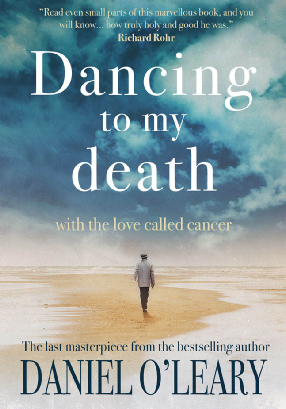It pulls no punches in terms of Daniel’s struggles to cope with his diagnosis, the challenges of the cancer treatment, and the emotional rollercoaster of facing his own death, which each of us must face at some point in time. During his final illness, Daniel re-
And as Daniel reflects on his faith and beliefs he writes” Even in my current shock and confusion around the sudden shattering of my cancer-
When Daniel O’Leary died on the 21st January 2019 his diary was booked up for 18 months ahead, still full of engagements, criss-
“And even then, as I know to my cost and current experience, when our familiar way of living is disrupted or challenged by a new bombshell falling into our lives….either to do with a great loss, a great love or a great suffering….. we are still unlikely to let go of our past holy habits, our past devotional certainties, our inherent self-
……reminding us of the lines from Raymond Carver “ And did you get what you wanted from this life, even so ? I did. And what did you want ? To call myself beloved, to feel myself beloved on the earth.”
Alongside his desire to be calm and reflective, Daniel finds his anger surfaces also when he looks at the Institutional Church today “During these months of my sometimes angry reflection, of my painful disillusionment, of my sharp criticism of the Institution’s shocking male arrogance and triumphalism, I find comfort and trust, delight and healing, only in the most beautiful face of the Incarnate God, the true heart of the Christian faith”.
On page 166 he comments that David Attenborough cries more now than ever before: the more recent reason being the plight of the young penguins dying in the Antartic ……this triggers off his own moments of personal vulnerability, of tears and weeping and he admits that his heart is broken at the gravity of his situation, “I cried a lot those late summer days ……. since my first reaction to the news of cancer …. and that response has spread out into other vulnerable dimensions of my life, as though the possibility of losing it soon has opened up a heightened sensitivity to deeper things … a lone seagull swooping across my window can do it …. or a giggling child on her father’s back, or the first browning of the leaves, or memories of my Mother at Christmas. I cry at things of pathos, of beauty, of cruelty, of terror, certain words of intimacy in an email, a touch I know that is full of compassion, a lush descending strain of a Mozart concerto, a look of love …….. they are not tears of doom and gloom, of desperation or sadness. They are the tears of things “ Lacrima rerum” that lie at the heart of everything” ….
Finally on page 197 he writes….. And my secret hope is that in your own hour of need, you may find unexpected graces to hold you,as you ponder these divine words of pure love and being …. Rabindranath Tagore’s poem always rings a bell in my heart….
“I thought that my voyage had come to its end at the last limit of my power;
That the path before me was closed, that provisions were exhausted
And the time had come to take shelter in a silent obscurity.
But I find that thy will knows no end in me and when old words die out on the tongue,
New melodies break out from the heart;
And where the old tracks are lost, new country is revealed with its wonders”
Surely a book of reflections that is worth having …..

Daniel … or Dónal O’Leary’s roots were truly Irish, deep in the soil of Rathmore, a gentle place in Co Kerry, where he often came home to refresh his mind , heart and body. He worked as priest in parishes across the Diocese of Leeds for 30 years, and for 20 years taught Theology and Religious Education in St Mary’s University College in London. He was known across the world as a best-
The title of this book may seem depressing at first glance, but the content is anything but depressing. Despite his courage in writing this, his final book, he does not attempt to conceal his anguish: indeed the reverse. Personal authenticity was always one of his goals, and he sets out to be honest at all costs: the early morning terrors, the inability to see beyond his own pain, especially post-
Book Review
by
Méabh Ní Uallacháin
